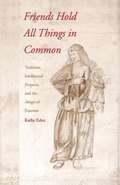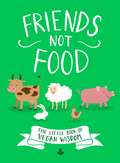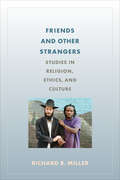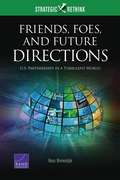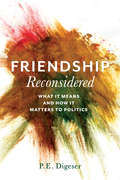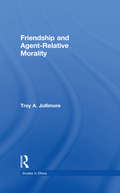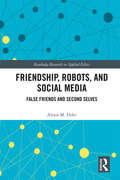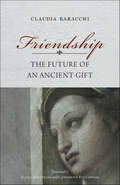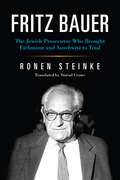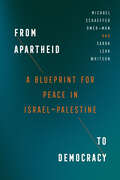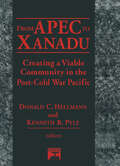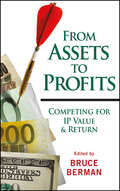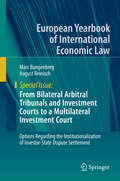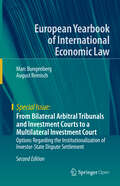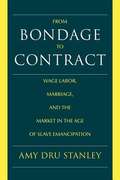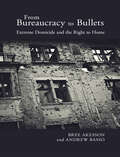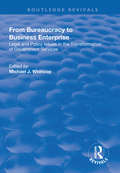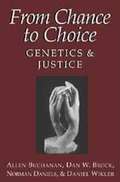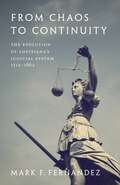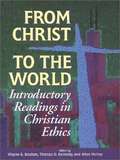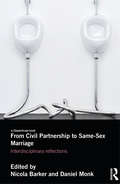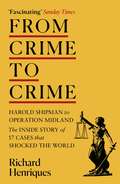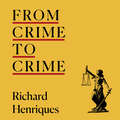- Table View
- List View
Friends Hold All Things in Common: Tradition, Intellectual Property, and the Adages of Erasmus
by Kathy EdenResponding in 1523 to a request from his friend John Botzheim, then Canon of Constance, to provide a catalogue of his works, Erasmus recalls among many other things the unfortunate events that occasioned his making a collection of Greek and Roman proverbs--the project that secured his literary fame throughout Europe and that has come down to us as the Adages.
Friends Not Food: The Little Book of Vegan Wisdom
by AnonymousChickens, Cows, Ducks, Sheep, Pigs, Rabbits, Trout, Salmon, Prawns, Lobsters - all of the animal kingdom - are not here for us to eat, we should be looking after them.Friends Not Food is a celebration of our relationship with our animal friends and is packed with vegan sayings as well as facts about both those animals and the industries that prey on them.The perfect gift for anyone who loves animals!And whilst you #StayHome, don't miss these other great titles from Sphere Books: ** Distract Yourself: 101 Positive Things to Do and Learn Whilst You Stay Home ** ** The Bumper Book of Would You Rather? Over 350 hilarious hypothetical questions for ages 6 to 106 **** Home Sweet Home: The Little Book of Natural Cleaning **** Shelf Respect: A Book Lovers' Guide to Curating Book Shelves at Home **
Friends Not Food: The Little Book of Vegan Wisdom
by AnonymousChickens, Cows, Ducks, Sheep, Pigs, Rabbits, Trout, Salmon, Prawns, Lobsters - all of the animal kingdom - are not here for us to eat, we should be looking after them.Friends Not Food is a celebration of our relationship with our animal friends and is packed with vegan sayings as well as facts about both those animals and the industries that prey on them.The perfect gift for anyone who loves animals!And whilst you #StayHome, don't miss these other great titles from Sphere Books: ** Distract Yourself: 101 Positive Things to Do and Learn Whilst You Stay Home **** The Bumper Book of Would You Rather? Over 350 hilarious hypothetical questions for ages 6 to 106 **** Home Sweet Home: The Little Book of Natural Cleaning **** Shelf Respect: A Book Lovers' Guide to Curating Book Shelves at Home **
Friends and Other Strangers: Studies in Religion, Ethics, and Culture
by Richard B. MillerRichard B. Miller aims to stimulate new work in religious ethics through discussions of ethnography, ethnocentrism, relativism, and moral criticism; the ethics of empathy; the meaning of moral responsibility in relation to children and friends; civic virtue, loyalty, war, and alterity; the normative and psychological dimensions of memory; and religion and democratic life.
Friends and Other Strangers: Studies in Religion, Ethics, and Culture
by Richard MillerFriends and Other Strangers argues for expanding the field of religious ethics to address the normative dimensions of culture, interpersonal desires, friendships and family, and institutional and political relationships. Richard B. Miller urges religious ethicists to turn to cultural studies to broaden the range of the issues they address and to examine matters of cultural practice and cultural difference in critical and self-reflexive ways. Friends and Other Strangers critically discusses the ethics of ethnography; ethnocentrism, relativism, and moral criticism; empathy and the ethics of self-other attunement; indignation, empathy, and solidarity; the meaning of moral responsibility in relation to children and friends; civic virtue, war, and alterity; the normative and psychological dimensions of memory; and religion and democratic public life. Miller challenges distinctions between psyche and culture, self and other, and uses the concepts of intimacy and alterity as dialectical touchstones for examining the normative dimensions of self-other relationships. A wholly contemporary, global, and interdisciplinary work, Friends and Other Strangers illuminates aspects of moral life ethicists have otherwise overlooked.
Friends, Foes, and Future Directions
by Hans BinnendijkReport evaluates strategies for dealing with U.S. partners and adversaries in Europe, Asia, and the Middle East in a time of diminishing defense budgets and American public preference for a domestic focus. The three proposed strategies are to be more assertive, to be more collaborative, or to retrench from international commitments. Each strategy is constrained and a balance will need to be struck among them that varies from region to region.
Friendship Reconsidered: What It Means and How It Matters to Politics
by P. DigeserIn the history of Western thought, friendship's relationship to politics is checkered. Friendship was seen as key to understanding political life in the ancient world, but it was then ignored for centuries. Today, friendship has again become a desirable framework for political interaction. In Friendship Reconsidered, P. E. Digeser contends that our rich and varied practices of friendship multiply and moderate connections to politics. Along the way, she sets forth a series of ideals that appreciates friendship's many forms and its dynamic relationship to individuality, citizenship, political and legal institutions, and international relations. Digeser argues that, as a set of practices bearing a family resemblance to one another, friendship calls our attention to the importance of norms of friendly action and the mutual recognition of motive. Focusing on these attributes clarifies the place of self-interest and duty in friendship and points to its compatibility with the pursuit of individuality. She shows how friendship can provide islands of stability in a sea of citizen-strangers and, in a delegitimized political environment, a bridge between differences. She also explores how political and legal institutions can both undermine and promote friendship. Digeser then looks to the positive potential of international friendships, in which states mutually strive to protect the just character of one another's institutions and policies. Friendship's repertoire of motives and manifestations complicates its relationship to politics, Digeser concludes, but it can help us realize the limits and possibilities for generating new opportunities for cooperation.
Friendship and Agent-Relative Morality (Studies in Ethics)
by Troy A. JollimoreFirst Published in 2001. Routledge is an imprint of Taylor & Francis, an informa company.
Friendship, Robots, and Social Media: False Friends and Second Selves (Routledge Research in Applied Ethics)
by Alexis M. ElderVarious emerging technologies, from social robotics to social media, appeal to our desire for social interactions, while avoiding some of the risks and costs of face-to-face human interaction. But can they offer us real friendship? In this book, Alexis Elder outlines a theory of friendship drawing on Aristotle and contemporary work on social ontology, and then uses it to evaluate the real value of social robotics and emerging social technologies. In the first part of the book Elder develops a robust and rigorous ontology of friendship: what it is, how it functions, what harms it, and how it relates to familiar ethical and philosophical questions about character, value, and well-being. In Part II she applies this ontology to emerging trends in social robotics and human-robot interaction, including robotic companions for lonely seniors, therapeutic robots used to teach social skills to children on the autism spectrum, and companionate robots currently being developed for consumer markets. Elder articulates the moral hazards presented by these robots, while at the same time acknowledging their real and measurable benefits. In the final section she shifts her focus to connections between real people, especially those enabled by social media. Arguing against critics who have charged that these new communication technologies are weakening our social connections, Elder explores ways in which text messaging, video chats, Facebook, and Snapchat are enabling us to develop, sustain, and enrich our friendship in new and meaningful ways.
Friendship: The Future of an Ancient Gift (Studies in Continental Thought)
by Claudia BaracchiIn Friendship, Italian philosopher Claudia Baracchi explores the philosophical underpinnings of friendship. Tackling the issue of friendship in the era of Facebook and online social networks requires courage and even a certain impertinence. The friendship relationship involves trust, fidelity, and availability for profound sharing. Sociologists assure us this attitude was never more improbable than in our time of dramatic anthropological reconfiguration. Research on friendship cannot therefore ignore ancient thought: with unparalleled depth, Friendship examines the broader implications of relationship, both emotional and political. Today, the grand socio-political structures of the world are trembling. The hold of valued paradigms that traditionally positioned individuals, determined their destinies, and assigned them their roles and reciprocal responsibilities is becoming uncertain. In these many global shifts, previously unforeseen possibilities for individual and collective becoming are unleashed. Perhaps friendship has to do with worlds that are not: that are not yet, and that should be desired all the more. Focusing on the works of Aristotle, Baracchi explores ancient reflections on friendship, in the belief that they have much to teach us about our relationships in the present day.
Fritz Bauer: The Jewish Prosecutor Who Brought Eichmann and Auschwitz to Trial (German Jewish Cultures Ser.)
by Ronen SteinkeA biography of the German Jewish judge and lawyer who survived the Holocaust, brought the Nazis to justice, and fought for the rights of homosexuals. German Jewish judge and prosecutor Fritz Bauer (1903–1968) played a key role in the arrest of Adolf Eichmann and the initiation of the Frankfurt Auschwitz trials. Author Ronen Steinke tells this remarkable story while sensitively exploring the many contributions Bauer made to the postwar German justice system. As it sheds light on Bauer&’s Jewish identity and the role it played in these trials and his later career, Steinke&’s deft narrative contributes to the larger story of Jewishness in postwar Germany. Examining latent antisemitism during this period as well as Jewish responses to renewed German cultural identity and politics, Steinke also explores Bauer&’s personal and family life and private struggles, including his participation in debates against the criminalization of homosexuality—a fact that only came to light after his death in 1968. This new biography reveals how one individual&’s determination, religion, and dedication to the rule of law formed an important foundation for German post war society.&“What is clear—and what this book makes clear—is that without people like Fritz Bauer there would have been none of this prosecution of Nazi atrocities, no trials for Auschwitz camp guards or Adolf Eichmann, no rehabilitation of the German resistance against Hitler. Ronen Steinke deserves thanks for bringing this message of Fritz Bauer back to light in such an accessible form, balancing professional distance and sympathy.&” —Kai Ambos, Criminal Law Forum&“Illuminates the biography of a central actor in Germany&’s coming to terms with its Nazi past.&” —Jacob S. Eder, author of Holocaust Angst
From Apartheid to Democracy: A Blueprint for Peace in Israel-Palestine
by Michael Schaeffer Omer-Man Sarah Leah WhitsonA decisive break from the failed Oslo Accords and an innovative plan to create the foundations for peace and self-determination in Israel-Palestine. For more than three decades, the illusion of a two-state solution under the auspices of the Oslo Accords has allowed Israel to maintain a one-state reality of permanent occupation and apartheid. Michael Schaeffer Omer-Man and Sarah Leah Whitson challenge this approach, presenting a road map to end these crimes and create a rights-respecting regime for everyone now living under Israeli control. Only once basic safety and legal equality are assured can Jewish Israelis and Palestinians determine their futures—in one, two, or more states if they choose—through an inclusive, democratic process. Breaking with the failures of the past, the plan presented here makes clear that ongoing violations of basic human rights must be ended before issues of governance can be equitably addressed. Clear-eyed yet hopeful, Omer-Man and Whitson offer proof of concept that democracy and equality are indeed attainable—and call on the international community to create the conditions required for them to flourish.
From Apec to Xanadu: Creating a Viable Community in the Post-cold War Pacific
by Kenneth B. Pyle Donald C. Helleman Donald C. HellmanThis volume analyzes the concerns that must be addressed if Asia-Pacific Economic Cooperation (APEC) is to be a viable component of the post-Cold War international order, such as what the future role of the USA who made Asia's transformation possible since 1945, is as a leader in that region.
From Assets to Profits
by Bruce BermanEdited by IP communications expert Bruce Berman, and with contributions from the top names in IP management, investment and consulting, From Assets to Profits: Competing for IP Value and Return provides a real-world look at patents, copyrights, and trademarks, how intellectual property assets work and the subtle and not-so-subtle ways in which they are used for competitive advantage. Authoritative and insightful, From Assets to Profits reveals the most relevant ways to generate return on innovation, with advice and essential guidance from battle tested IP pros.
From Bilateral Arbitral Tribunals and Investment Courts to a Multilateral Investment Court: Options Regarding The Institutionalization Of Investor-state Dispute Settlement (European Yearbook of International Economic Law)
by August Reinisch Marc BungenbergThis book considers the potential setup for a future Multilateral Investment Court (MIC). The option of an MIC was first discussed by the EU Commission in 2016 and has since been made an official element of the EU Common Commercial Policy. In 2017, UNCITRAL also decided to discuss the possibility of an MIC, and on 20 March 2018, the Council of the EU gave the EU Commission the mandate to negotiate the creation of an MIC. The “feasibility study” presented here is intended to contribute to a broader discussion on the options for a new international court specialized in investment protection. The cornerstones of such a new permanent court are a strict orientation on the rule of law, reduced costs of investment protection, transparency considerations, aspects of consistency in case law, and the effective enforceability of MIC decisions.
From Bilateral Arbitral Tribunals and Investment Courts to a Multilateral Investment Court: Options Regarding the Institutionalization of Investor-State Dispute Settlement (European Yearbook of International Economic Law)
by August Reinisch Marc BungenbergThis open access book considers the potential setup for a future Multilateral Investment Court (MIC). The option of an MIC was first discussed by the EU Commission in 2016 and has since been made an official element of the EU Common Commercial Policy. In 2017, UNCITRAL also decided to discuss the possibility of an MIC, and on 20 March 2018, the Council of the EU gave the EU Commission the mandate to negotiate the creation of an MIC. The “feasibility study” presented here is intended to contribute to a broader discussion on the options for a new international court specialized in investment protection. The cornerstones of such a new permanent court are a strict orientation on the rule of law, reduced costs of investment protection, transparency considerations, aspects of consistency in case law, and the effective enforceability of MIC decisions.
From Bondage To Contract: Wage Labor, Marriage, And The Market In The Age Of Slave Emancipation
by Amy Dru StanleyThis book explores how a generation of American thinkers and reformers - abolitionists, former slaves, feminists, labor advocates, jurists, moralists, and social scientists - drew on contract to condemn the evils of chattel slavery as well as to measure the virtues of free society. Their arguments over the meaning of slavery and freedom were grounded in changing circumstances of labor and home life on both sides of the Mason-Dixon line. At the heart of these arguments lay the problem of defining which realms of self and social existence could be rendered market commodities and which could not. From Bondage to Contract reveals how the problem of distinguishing between what was saleable and what was not reflected the ideological and social changes wrought by the concurrence of abolition in the South and burgeoning industrial capitalism in the North.
From Bureaucracy to Bullets: Extreme Domicide and the Right to Home (Genocide, Political Violence, Human Rights)
by Bree Akesson Andrew R. BassoThere are currently a record-setting number of forcibly displaced persons in the world. This number continues to rise as solutions to alleviate humanitarian catastrophes of large-scale violence and displacement continue to fail. The likelihood of the displaced returning to their homes is becoming increasingly unlikely. In many cases, their homes have been destroyed as the result of violence. Why are the homes of certain populations targeted for destruction? What are the impacts of loss of home upon children, adults, families, communities, and societies? If having a home is a fundamental human right, then why is the destruction of home not viewed as a rights violation and punished accordingly? From Bureaucracy to Bullets answers these questions and more by focusing on the violent practice of extreme domicide, or the intentional destruction of the home, as a central and overlooked human rights issue.
From Bureaucracy to Business Enterprise: Legal and Policy Issues in the Transformation of Government Services (Law, Ethics And Governance Ser.)
by Michael J. WhincopThis title was first published in 2003.This book analyzes the policy initiatives used in Australia, New Zealand, the United Kingdom, and the United States to improve the efficiency of government service delivery, such as commercialization, privatization, and, in particular, corporatization. The book looks at how markets, corporate governance processes, and judicial and administrative reviews affect the efficiency and ethics of service delivery. The book crosses a number of academic disciplines - corporate law and governance, law and economics, public choice theory, ethics and public law and administration. It will also be of value to a range of professional constituencies - to those involved in governance functions in government and privatized corporations, to professionals servicing these organizations, and to officials administering government services. These issues are also highly pertinent to emerging economies where governance of public services is crucial to the transition to market democracy.
From Chance to Choice: Genetics and Justice
by Allen Buchanan Norman Daniels Daniel Wikler Dan BrockWritten by four internationally renowned bioethicists, From Chance to Choice is the first systematic treatment of the fundamental ethical issues underlying the application of genetic technologies to human beings. Probing the implications of the remarkable advances in genetics, the authors ask how should these affect our understanding of distributive justice, equality of opportunity, the rights and obligations as parents, the meaning of disability, and the role of the concept of human nature in ethical theory and practice. The book offers a historical context to contemporary debate over the use of these technologies by examining the eugenics movement of the late 19th and early 20th centuries. In addition, appendices explain the nature of genetic causation, gene-environment interaction, and expose widespread misconceptions of genetic determinism, as well as outlining the nature of the ethical analysis used in the book. The questions raised in this book will be of interest to any reflective reader concerned about science and society and the rapid development of biotechnology, as well as to professionals in such areas as philosophy, bioethics, medical ethics, health management, law, and political science.
From Chaos to Continuity: The Evolution of Louisiana's Judicial System, 1712–1862
by Mark FernandezHistorians have long viewed Louisiana as an anomaly in the American judicial system-an eccentric appendage at the mouth of the Mississippi River. The diverse Creole culture and civilian heritage of the state's legal system have led many scholars to conclude that it is an anachronism in American law unworthy of serious attention. Others embrace this tradition and revel in the minutiae of the Pelican State's unique civil law legacy. In From Chaos to Continuity, Mark F. Fernandez challenges both perspectives. Using the innovative methods of the New Louisiana Legal History, he offers the first comprehensive analysis of the role of the courts in the development of Louisiana's legal system and convincingly argues that the state is actually a representative model of American law and justice. Tracing the rise of Louisiana's system from its earliest colonial origins to its closure during Federal occupation in 1862, Fernandez describes the introduction of common law after American takeover of the colony; the chaotic combination of French, Spanish, and Anglo legal traditions; the evolution of that jurisdiction; the role of the courts-especially the state supreme court-in maintaining the mixture; and the judge's proper function in administering justice. According to Fernandez, the challenge of integrating two very different systems of law was not unique to Louisiana. Indeed, most antebellum southern states had legal systems that incorporated important traditional aspects of their colonial legal orders to varying degrees. From Chaos to Continuity liberates Louisiana's legal history from the quirky restraints of the past and allows scholars and students alike to see the state as an integral part of American legal history.
From Christ to the World: Introductory Readings in Christian Ethics
by Wayne G. Boulton Thomas D. Kennedy Allen VerheyThis is a single volume that effectively introduces students to the full breadth of the discipline of Christian ethics. This reader captures the range of timely issues related to ethics but not at the expense of essays that show the theoretical foundations of the field. Part One examines the sources of Christian EthicsScripture, tradition, philosophy, and science. The norms, forms, and contexts of Christian moral theories are reviewed in Part Two. The final section discusses contemporary questions about human sexuality, medical practice, the use of force, economic justice, ecological responsibility, and more. Relevant biblical readings and a series of case studies accentuate the text. "
From Civil Partnership to Same-Sex Marriage: Interdisciplinary Reflections
by Nicola Barker Daniel MonkThe Civil Partnership Act 2004 and the Marriage (Same Sex Couples) Act 2013 are important legal, social and historical landmarks, rich in symbolic, material and cultural meanings. While fiercely opposed by many, within mainstream narratives they are often represented as a victory in a legal reform process that commenced with the decriminalisation of homosexuality. Yet, at the same time, for others they represent a problematic and ambivalent political engagement with the institution of marriage. Consequently, understood or labelled as ‘revolutionary’, ‘progressive’ and ‘conservative’, these legal reforms provide a space for thinking about issues that arguably affect everyone, regardless of sexual orientation or relationship status. This edited collection brings together scholars and commentators from a range of backgrounds, generations and disciplines to reflect on the first ten years of civil partnerships and the introduction of same-sex marriage. Rather than rehearsing the arguments ‘for’ and ‘against’ relationship recognition, the essays ask original questions, draw on a variety of methods and collectively provide a detailed and reflective ‘snap shot’ of a critical moment, a ‘history of the present’ as well as providing a foundation for innovative ways of thinking about and engaging with the possibilities and experiences arising from the new reality of relationship recognition for gays and lesbians.
From Crime to Crime: Harold Shipman to Operation Midland - 17 cases that shocked the world
by Richard Henriques'If Henriques were a fictional character, he would be a celebrity, the kind of dashing, hawkish QC who turns up in Agatha Christie novels and is recognised by everybody... There is an undeniable, lawyerly authenticity about Henriques's book. He takes us meticulously through his cases... It is fascinating to read.' - Dominic Sandbrook, Sunday TimesSir Richard Henriques has been centre stage in some of the most high-profile and notorious cases of the late 20th and early 21st centuries. After taking silk in 1986, over the course of the next 14 years he appeared in no fewer than 106 murder trials, including prosecuting Harold Shipman, Britain's most prolific serial killer, and the killers of James Bulger. In 2000 he was appointed to the High Court Bench and tried the transatlantic airline plot, the Morecambe Bay cockle pickers, the killing of Jean Charles de Menezes, and many other cases. He sat in the Court of Appeal on the appeals of Barry George, then convicted of murdering Jill Dando, and Jeremy Bamber, the White House Farm killer. In From Crime to Crime he not only recreates some of his most famous cases but also includes his trenchant views on the state of the British judicial system; how it works - or doesn't - and the current threats to the rule of law that affect us all.
From Crime to Crime: Harold Shipman to Operation Midland - 17 cases that shocked the world
by Richard HenriquesSir Richard Henriques has been centre stage in some of the most high-profile and notorious cases of the late 20th and early 21st centuries. After taking silk in 1986, over the course of the next 14 years he appeared in no fewer than 106 murder trials, including prosecuting Harold Shipman, Britain's most prolific serial killer, and the killers of James Bulger. In 2000 he was appointed to the High Court Bench and tried the transatlantic airline plot, the Morecambe Bay cockle pickers, the killing of Jean Charles de Menezes, and many other cases. He sat in the Court of Appeal on the appeals of Barry George, then convicted of murdering Jill Dando, and Jeremy Bamber, the White House Farm killer. In From Crime to Crime Richard Henriques tells the story behind his most famous cases and includes his trenchant views on the state of the British judicial system; how it works - or doesn't - and the current threats to the rule of law that affect us all.(P) 2020 Hodder & Stoughton Ltd
